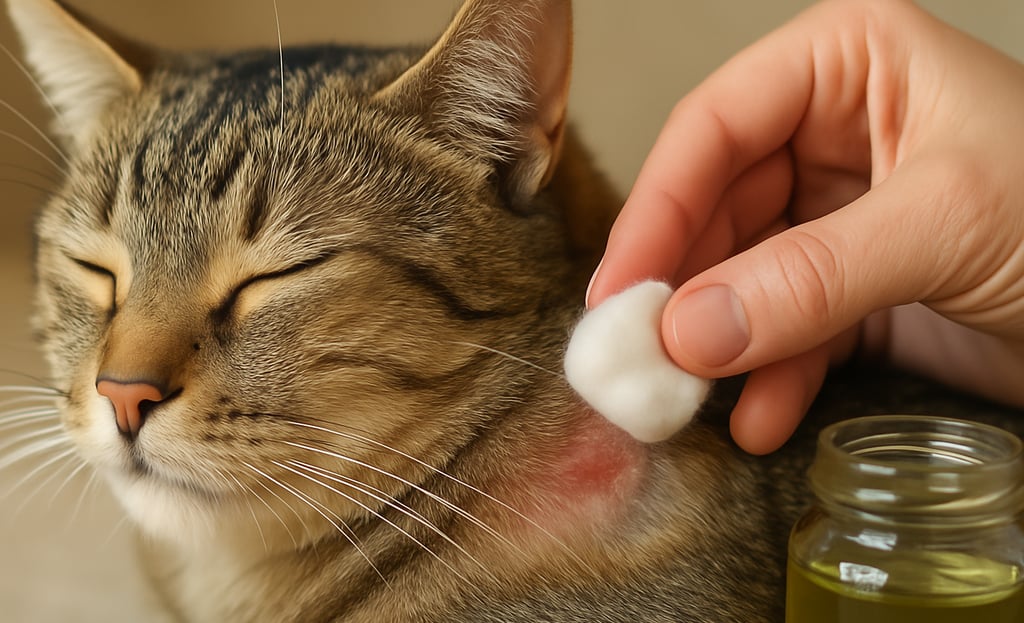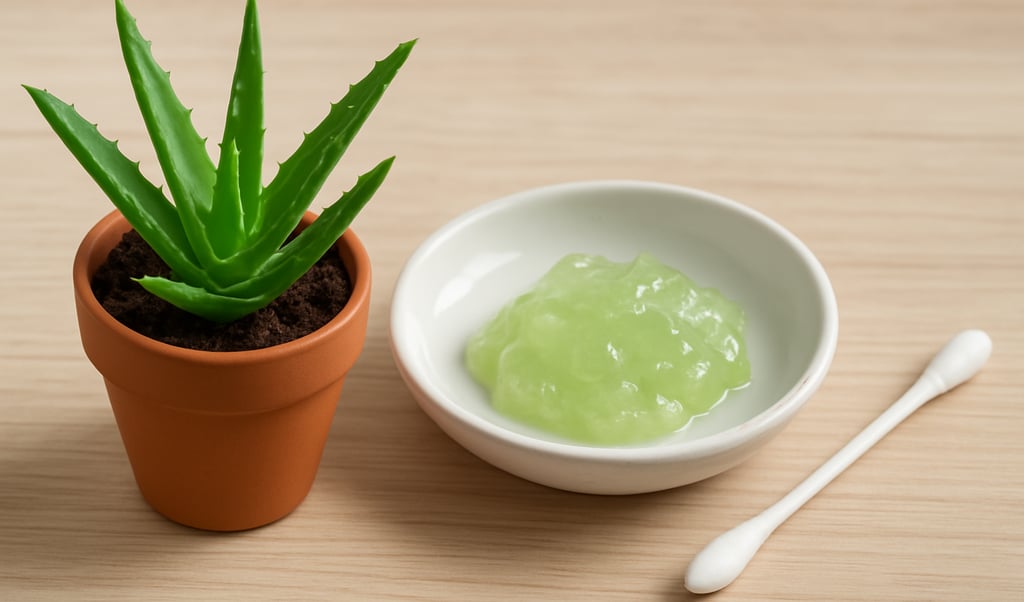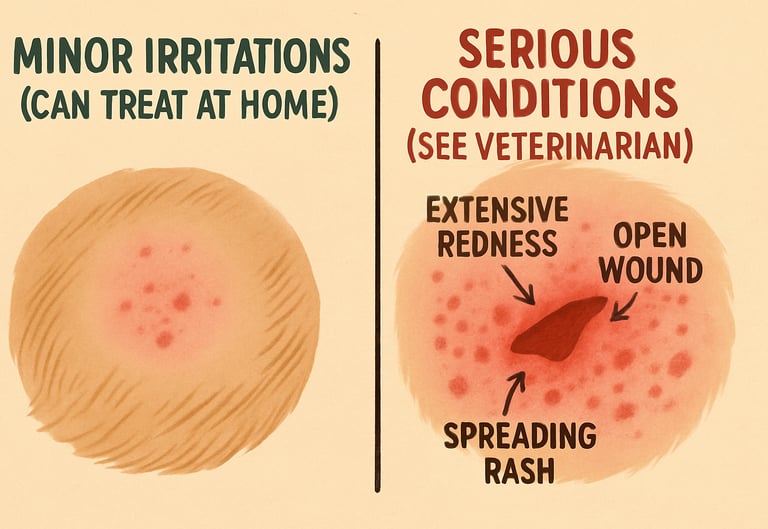Soothing Minor Skin Irritations in Cats Naturally (And When to Worry)
SAFE & NATURAL CARE FOR MINOR EMERGENCIES


Minor skin issues are common in our feline friends, but not all require a vet visit. Learn how to safely address small irritations with gentle, natural remedies while knowing when professional care is needed.
Our cats' skin health can be affected by numerous factors, from environmental allergens to minor scrapes during play. As eco-conscious pet parents, we often seek natural solutions that are gentle on both our cats and the planet. While serious skin conditions always warrant veterinary care, there are several safe, natural approaches for addressing minor irritations at home.
This guide explores effective natural remedies for common minor skin issues in cats, with clear guidelines on when to seek professional help. By understanding these distinctions, you can provide immediate comfort for minor problems while ensuring serious conditions receive proper medical attention.
Common Minor Skin Irritations in Cats
Before discussing remedies, it's helpful to understand the types of minor skin issues that can often be safely managed at home:
1. Small Dry Patches
Cats can develop small areas of dry, flaky skin, particularly during winter months or in dry climates. These patches may appear as:
Flaky areas, often on the back near the tail
Mild dandruff in the coat
Slightly rough or scaly spots without redness or inflammation
2. Minor Environmental Allergies
Seasonal or environmental allergies can cause mild skin reactions, including:
Occasional scratching without skin damage
Slight redness in areas with thinner fur
Minor "hot spots" (small irritated areas from excessive licking)
3. Insect Bites
Single insect bites (like mosquito or flea bites) may cause:
Small raised bumps
Mild localized swelling
Slight redness
Occasional scratching at the area
4. Minor Abrasions
Active cats may experience small scrapes during play or exploration:
Superficial scratches that don't penetrate all skin layers
Small areas of fur loss without significant skin damage
Minor irritation from rubbing against rough surfaces
5 Natural Remedies for Minor Skin Irritations
When addressing these minor issues, several natural approaches can provide relief while supporting the skin's healing process.
1. Aloe Vera Gel: Nature's Skin Soother
Pure aloe vera gel offers remarkable soothing properties for minor skin irritations. This succulent plant contains compounds that reduce inflammation, provide moisture, and support healing.
How to Use:
Use only pure, fresh aloe vera gel (either directly from the plant or 100% pure commercial gel without additives)
Ensure the product contains NO added essential oils, alcohol, or preservatives that could harm cats
Apply a thin layer to the affected area 1-2 times daily
Monitor to ensure your cat doesn't lick excessive amounts
Important Safety Note: While the gel inside aloe leaves is safe in small amounts, the outer leaf contains aloin, which is toxic to cats if ingested in large quantities. Always prevent your cat from chewing on aloe plants and use only the inner gel for topical applications.
2. Colloidal Oatmeal Rinse: The Gentle Reliever
Colloidal oatmeal has been used for centuries to soothe irritated skin. It contains compounds that reduce inflammation and itching while providing a protective barrier.
How to Make and Use:
Grind plain, unflavored oatmeal into a fine powder using a blender or food processor
Add 1 cup of the oatmeal powder to a bathtub or basin with 2 inches of lukewarm water
Stir until the water becomes milky and slightly thickened
Gently soak the affected area for 5-10 minutes (for small areas, apply with a clean cloth)
Pat dry gently without rinsing
Repeat daily as needed for relief
This remedy is particularly effective for dry skin, mild allergic reactions, and general itchiness.
3. Calendula Solution: The Healing Herb
Calendula (pot marigold) contains compounds that support skin healing, reduce inflammation, and provide antimicrobial benefits for minor irritations.
How to Prepare and Use:
Make a calendula infusion by steeping 2 tablespoons of dried calendula flowers in 1 cup of boiled water for 15 minutes
Strain and allow to cool completely
Apply to affected areas with a clean cotton ball 2-3 times daily
Alternatively, purchase a pet-safe calendula spray or salve (ensure it contains no essential oils harmful to cats)
Calendula works well for minor abrasions, small hot spots, and areas of mild irritation.
4. Witch Hazel: The Gentle Astringent
Witch hazel is a natural astringent that can help reduce inflammation and itching while cleansing minor irritations.
How to Use:
Use only alcohol-free witch hazel (alcohol can be drying and uncomfortable)
Apply a small amount to a cotton ball
Gently dab onto the affected area 1-2 times daily
Do not use on open wounds or deep scratches
This remedy is particularly helpful for insect bites, minor hot spots, and areas of mild inflammation.
5. Chamomile Tea Compress: The Calming Solution
Chamomile contains anti-inflammatory and mild antiseptic properties that can soothe irritated skin and provide gentle relief.
How to Prepare and Use:
Brew a strong cup of pure chamomile tea using 2 tea bags (ensure it contains ONLY chamomile, no other herbs or additives)
Allow to cool completely
Soak a clean cloth in the tea and wring out excess
Apply as a compress to the affected area for 5-10 minutes
Repeat 2-3 times daily as needed
This gentle approach works well for mild redness, minor irritations, and small areas of inflammation.
Application Tips for Success
When using any natural remedy on your cat's skin:
Start Small: Test on a tiny area first to ensure no adverse reaction
Be Gentle: Never scrub or rub irritated skin vigorously
Prevent Licking: Monitor your cat after application or consider a soft recovery collar if necessary
Consistency: Most natural remedies require regular application to be effective
Clean First: Always gently clean the area with warm water before applying any remedy
Less is More: Use small amounts of any remedy to prevent excessive wetness or residue
Creating a Supportive Environment for Healing
Beyond topical remedies, creating the right environment can significantly support skin healing:
Humidity Control: Use a humidifier in dry environments to prevent skin dryness
Regular Brushing: Gentle brushing distributes natural oils and removes allergens
Clean Bedding: Wash your cat's bedding weekly in fragrance-free, gentle detergent
Filtered Water: Provide fresh, filtered water to support overall skin health
Stress Reduction: Minimize stressors, as stress can exacerbate skin conditions
Appropriate Diet: Ensure your cat receives omega-3 fatty acids for skin health
When to Worry: Red Flags That Require Veterinary Care
While natural remedies can be effective for minor issues, many skin conditions require professional veterinary care. Seek veterinary attention if you notice:
Immediate Veterinary Care Needed:
Open Wounds or Deep Cuts: Any break in the skin that penetrates beyond the surface
Abscess: Swollen, painful areas that may contain pus
Burns: Any thermal, chemical, or electrical burn, regardless of size
Extensive Redness or Swelling: Inflammation that covers large areas or is severely swollen
Signs of Infection: Pus, yellow/green discharge, increasing pain, or warm-to-touch areas
Sudden Hair Loss: Rapid loss of fur in patches
Parasitic Infestations: Evidence of fleas, ticks, or mites (especially ear mites)
Veterinary Care Within 24-48 Hours:
Persistent Itching: Continuous scratching, licking, or biting at the skin
Spreading Rash: Any skin issue that expands beyond its original area
Non-Healing Irritations: Minor issues that don't improve within 48 hours of home treatment
Changes in Behavior: Lethargy, decreased appetite, or irritability associated with skin issues
Recurring Problems: Skin issues that resolve but keep returning
Preventative Measures for Healthy Feline Skin
The best approach to skin issues is prevention. Consider these proactive measures:
Regular Grooming: Brush your cat weekly (or more for long-haired breeds)
Flea Prevention: Use eco-friendly, vet-approved flea prevention methods
Balanced Diet: Feed high-quality food with appropriate fatty acids
Environmental Management: Reduce potential allergens in your home
Routine Check-ups: Include skin examination in regular veterinary visits
Limited Bathing: Only bathe cats when necessary using gentle, cat-specific products
The Eco-Friendly Advantage
Choosing natural remedies for minor skin issues aligns with eco-conscious values in several ways:
Reduced Chemical Exposure: Natural remedies minimize synthetic chemicals that can affect both your cat and the environment
Sustainable Ingredients: Many natural remedies come from renewable plant sources
Less Packaging Waste: Homemade remedies reduce single-use plastic packaging
Lower Carbon Footprint: Local or homegrown ingredients require less transportation
Water Conservation: Targeted treatments use less water than full baths
Integrating Natural Care with Veterinary Medicine
The most effective approach to feline skin health combines natural care with appropriate veterinary medicine:
Establish a Baseline: Have your veterinarian examine your cat's skin during wellness visits
Discuss Natural Options: Ask your vet which natural remedies they recommend for minor issues
Know Your Limits: Understand which conditions you can safely manage at home versus those requiring professional care
Document Responses: Keep notes on how your cat responds to different natural treatments
Regular Monitoring: Check your cat's skin weekly during grooming sessions
By thoughtfully integrating natural remedies with appropriate veterinary care, you can address minor skin irritations effectively while ensuring your cat receives proper treatment for more serious conditions.
Learn more about safe and effective natural remedies for a variety of minor skin issues in our detailed First-Aid Handbook. The Sustainable Cat First-Aid & Minor Issue Handbook provides comprehensive guidance on natural approaches to common cat health concerns, empowering you to provide thoughtful care that's gentle on your cat and the planet.
Disclaimer: This article is for informational purposes only and is not a substitute for professional veterinary advice. Always consult with your veterinarian before beginning any treatment program or if you're unsure about your cat's condition.






